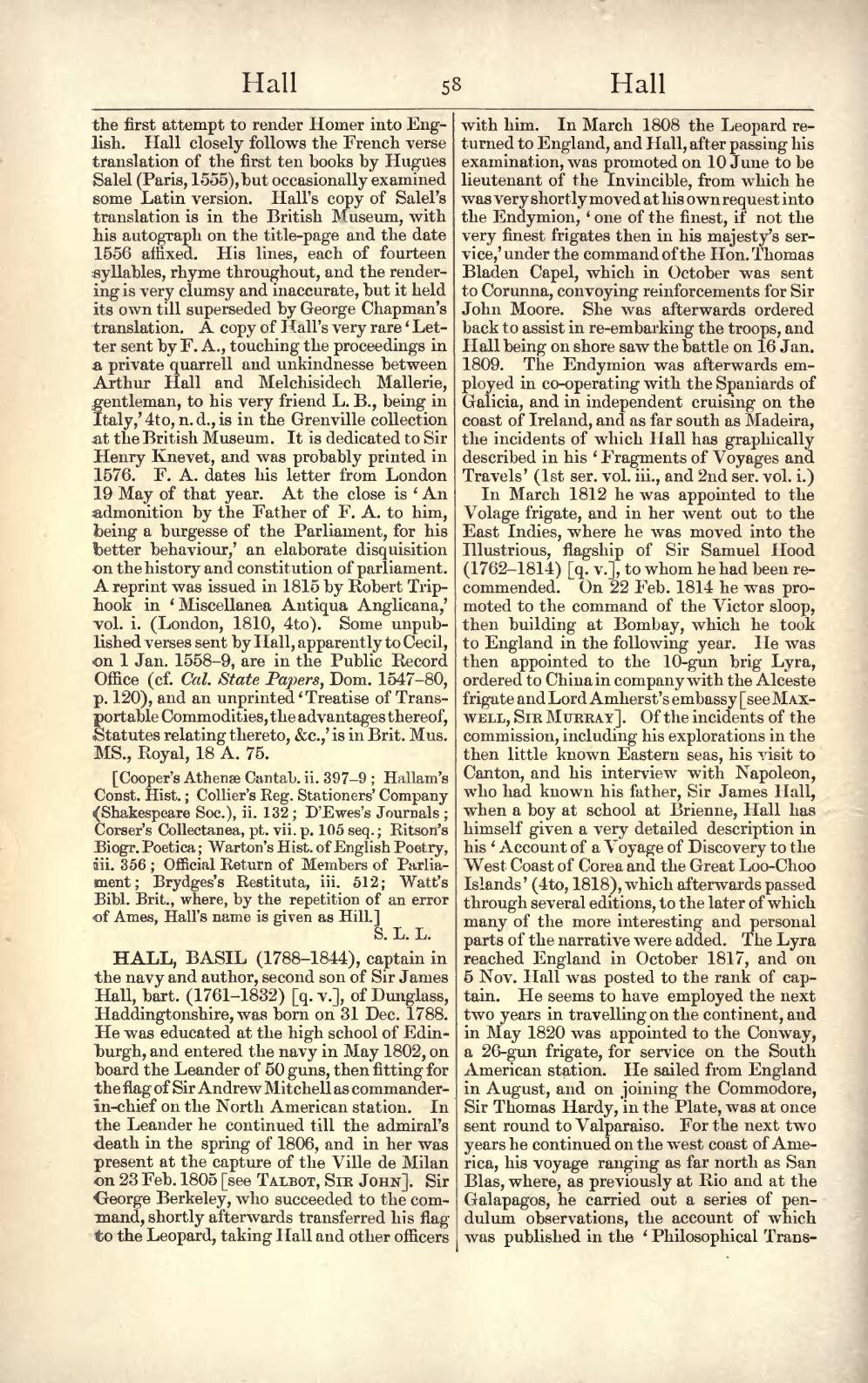the first attempt to render Homer into English. Hall closely follows the French verse translation of the first ten books by Hugues Salel (Paris, 1555), but occasionally examined some Latin version. Hall's copy of Salel's translation is in the British Museum, with his autograph on the title-page and the date 1556 affixed. His lines, each of fourteen syllables, rhyme throughout, and the rendering is very clumsy and inaccurate, but it held its own till superseded by George Chapman's translation. A copy of Hall's very rare 'Letter sent by F. A., touching the proceedings in a private quarrell and unkindnesse between Arthur Hall and Melchisidech Mallerie, gentleman, to his very friend L. B., being in Italy,' 4to, n.d., is in the Grenville collection at the British Museum. It is dedicated to Sir Henry Knevet, and was probably printed in 1576. F. A. dates his letter from London 19 May of that year. At the close is 'An admonition by the Father of F. A. to him, being a burgesse of the Parliament, for his better behaviour,' an elaborate disquisition on the history and constitution of parliament. A reprint was issued in 1815 by Robert Triphook in 'Miscellanea Antiqua Anglicana,' vol. i. (London, 1810, 4to). Some unpublished verses sent by Hall, apparently to Cecil, on 1 Jan. 1558-9, are in the Public Record Office (cf. Cal. State Papers, Dom. 1547-80, p. 120), and an imprinted 'Treatise of Transportable Commodities, the advantages thereof, Statutes relating thereto, &c.,' is in Brit. Mus. MS., Royal, 18 A. 75.
[Cooper's Athenæ Cantab, ii. 397-9; Hallam's Const. Hist.; Collier's Reg. Stationers' Company ((Shakespeare Soc.), ii. 132; D'Ewes's Journals; Corser's Collectanea, pt. vii. p. 105 seq.; Ritson's Biogr. Poetica; Warton's Hist. of English Poetry, iii. 356; Official Return of Members of Parliament; Brydges's Restituta, iii. 512; Watt's Bibl. Brit., where, by the repetition of an error of Ames, Hall's name is given as Hill.]
HALL, BASIL (1788–1844), captain in the navy and author, second son of Sir James Hall, bart. (1761–1832) [q. v.], of Dunglass, Haddingtonshire, was born on 31 Dec. 1788. He was educated at the high school of Edinburgh, and entered the navy in May 1802, on board the Leander of 50 guns, then fitting for the flag of Sir Andrew Mitchell as commander!n-chief on the North American station. In the Leander he continued till the admiral's death in the spring of 1806, and in her was present at the capture of the Ville de Milan on 23 Feb. 1805 [see Talbot, Sir John]. Sir George Berkeley, who succeeded to the command, shortly afterwards transferred his flag to the Leopard, taking Hall and other officers with him. In March 1808 the Leopard returned to England, and Hall, after passing his examination, was promoted on 10 June to be lieutenant of the Invincible, from which he was very shortly moved at his own request into the Endymion, 'one of the finest, if not the very finest frigates then in his majesty's service,' under the command of the Hon. Thomas Bladen Capel, which in October was sent to Corunna, convoying reinforcements for Sir John Moore. She was afterwards ordered back to assist in re-embarking the troops, and Hall being on shore saw the battle on 16 Jan. 1809. The Endymion was afterwards employed in co-operating with the Spaniards of Galicia, and in independent cruising on the coast of Ireland, and as far south as Madeira, the incidents of which Hall has graphically described in his 'Fragments of Voyages and Travels' (1st ser. vol. iii., and 2nd ser. vol. i.)
In March 1812 he was appointed to the Volage frigate, and in her went out to the East Indies, where he was moved into the Illustrious, flagship of Sir Samuel Hood (1762–1814) [q. v.], to whom he had been recommended. On 22 Feb. 1814 he was promoted to the command of the Victor sloop, then building at Bombay, which he took to England in the following year. He was then appointed to the 10-gun brig Lyra, ordered to China in company with the Alceste frigate and Lord Amherst's embassy [see Maxwell, Sir Murray]. Of the incidents of the commission, including his explorations in the then little known Eastern seas, his visit to Canton, and his interview with Napoleon, who had known his father, Sir James Hall, when a boy at school at Brienne, Hall has himself given a very detailed description in his 'Account of a Voyage of Discovery to the West Coast of Corea and the Great Loo-Choo Islands' (4to, 1818), which afterwards passed through several editions, to the later of which many of the more interesting and personal parts of the narrative were added. The Lyra reached England in October 1817, and on 5 Nov. Hall was posted to the rank of captain. He seems to have employed the next two years in travelling on the continent, and in May 1820 was appointed to the Conway, a 26-gun frigate, for service on the South American station. He sailed from England in August, and on joining the Commodore, Sir Thomas Hardy, 'in the Plate, was at once sent round to Valparaiso. For the next two years he continued on the west coast of America, his voyage ranging as far north as San Blas, where, as previously at Rio and at the Galapagos, he carried out a series of pendulum observations, the account of which was published in the 'Philosophical Trans-
